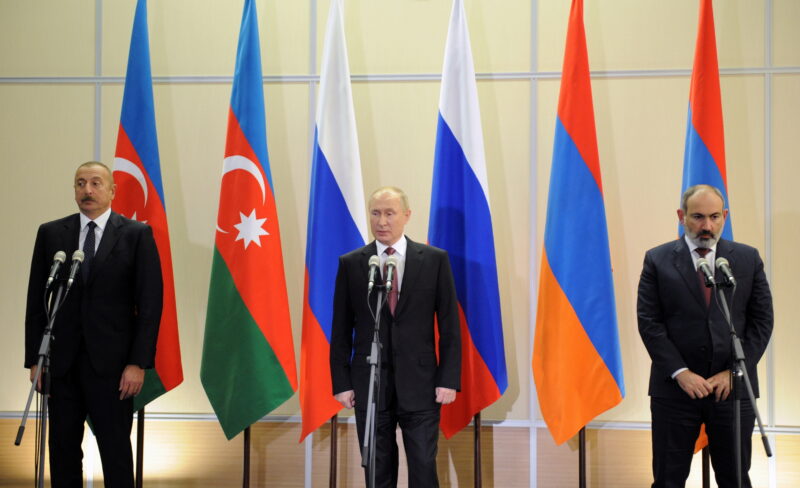On November 26 a series of bilateral and trilateral meetings were held in Sochi between the leaders of Russia, Azerbaijan and Armenia, to discuss recent developments in the Nagorno-Karabakh region. What were the results? What can we expect in the near future?
On November 16, 2021, the clashes along the border between Armenia and Azerbaijan erupted into harsh armed confrontations, with both sides reporting numerous casualties and blaming each other for the fighting. One year after the ceasefire in the Nagorno-Karabakh region (November 10, 2020), the breach of the peace deal shattered the hopes of a lasting peace and alerted the international community over a possible resumption of the war. Clashes between the two armies subsided soon, but only after Moscow’s mediation.
The meeting in Sochi
Following the recent events, the Kremlin announced that President Vladimir Putin would host Armenian Prime Minister Nikol Pashinyan and Azerbaijani President Ilham Aliyev in Sochi on November 26. The meeting, according to Russian authorities, was wanted by Putin himself in order to discuss the next steps “to strengthen stability and establish peace in the region”.
According to the joint statement published after the meeting, as a result of the three-hour-long discussions the leaders have agreed on several key points. First, the statement talks about the creation of a bilateral commission for the delimitation and demarcation of the borders between the two republics. After the meeting, Putin added that the achievement of this goal has no obstacles and is therefore expected by the end of this year. Secondly, the parties have agreed to reactivate economic and transport links in the South Caucasus, blocked up to date, through the formation of a tripartite working group. Priorities in this regard would include rail and road communications.
Prior to the meeting, Putin had included the “revival” of the region in the key points of the meeting. The Russian President did not specify what this “revival” will be about, but the results of the meeting suggest he was probably referring to the economic aspect. In fact, the statement reports that the leaders intend to launch targeted projects to tap “the economic potential of the region”.
Finally, the Russian side has reiterated its willingness to provide all necessary assistance to normalize the relations between the two countries and ensure good neighborly relations. Putin also mentioned discussions over humanitarian issues. The President declared that “significant progress” has been made in these regards, referring to the repatriation of prisoners of war and demining activities in the region.
Putin said the trio worked “constructively” and all three leaders described the meeting positively. Aliyev described the conversations also as “open” and “genuine”. In their respective remarks, both presidents – Armenian and Azerbajiani – said they are hopeful that the talks will lead to a “more secure and predictable” situation in the South Caucasus.
The day after the meeting, UN Secretary-General Antonio Guterres issued a statement appreciating the meeting in Sochi and declaring himself “encouraged”. Farhan Haq, his deputy spokesman, reported that Guterres praises Russia for its role as mediator and reiterates the importance of dialogue between the two republics for a long lasting peace, one of the pillars of the United Nations. This – says Guterres – can be carried out through all available channels, including the OSCE Minsk Group. Finally, the Secretary General reaffirmed the availability of the United Nations for any needed assistance, such as humanitarian, recovery and peacebuilding on the ground.
Further developments on this issue are expected in mid-December. Pashinyan and Aliyev will meet again in Brussels on December 15, within the framework of the Eastern Partnership Summit, together with the President of the European Council, Charles Michel.




